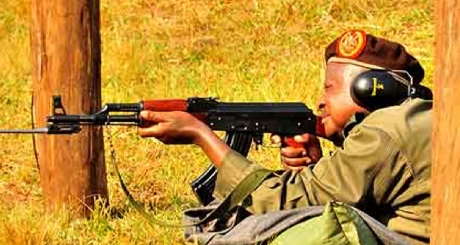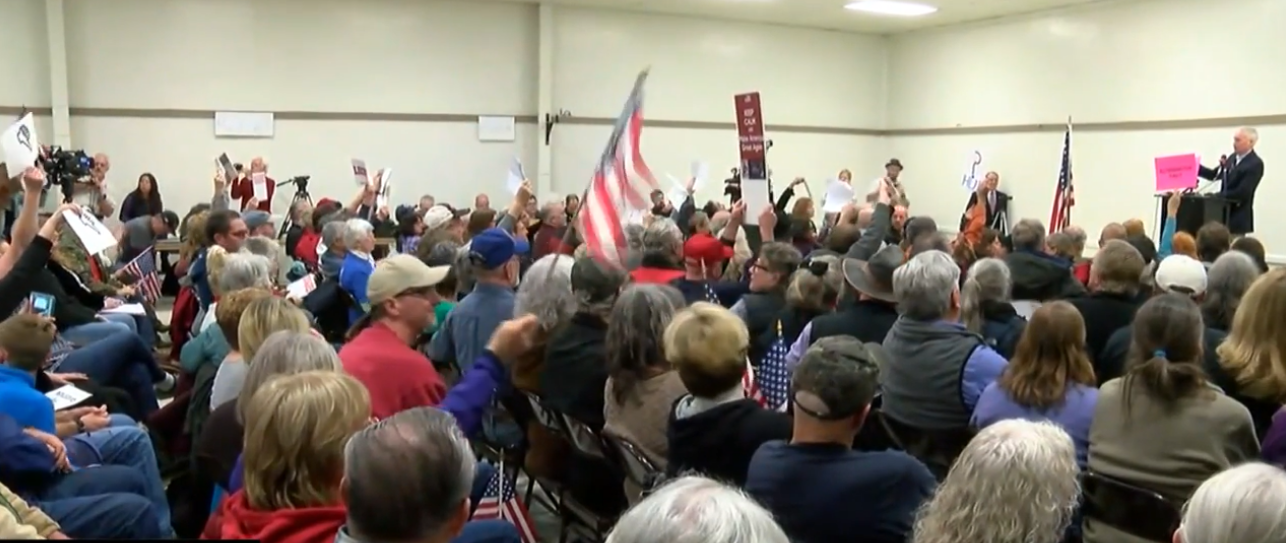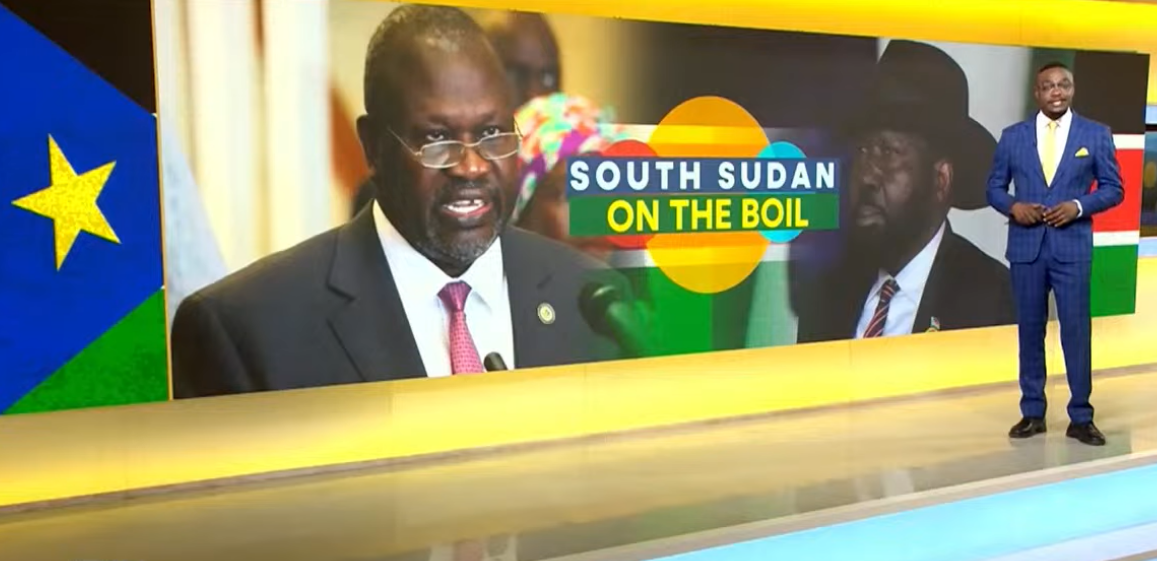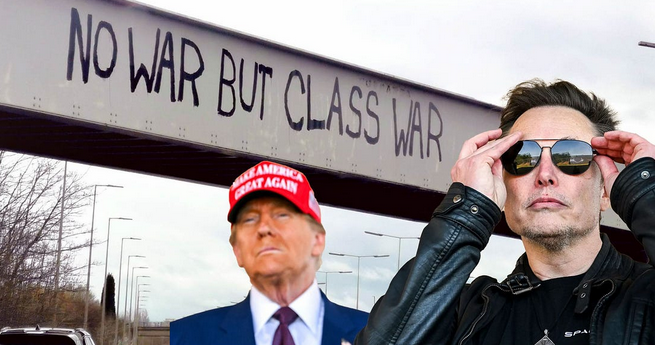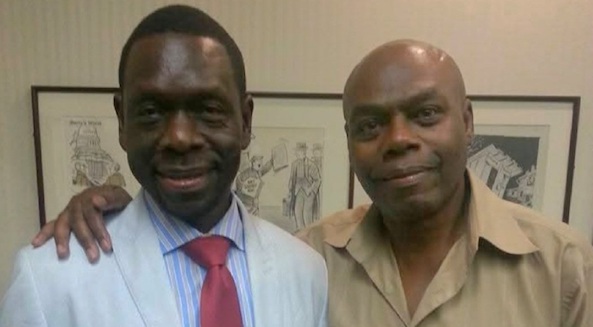Gen. Museveni taking aim — how many more times can he play the Gay Card?
[Publisher’s Comment]
Uganda’s Gen. Yoweri Museveni has ruled ruthlessly for 28 years largely with financial and military support from the U.S. and the U.K.
In recent years whenever he’s faced a domestic crises such as a wave of protests from opposition parties or backlash over one of his numerous invasions of a neighboring country, he’s found a way to divert global media attention. He plays the Gay Card.
Gen. Museveni stirs up hatred towards Gays in Uganda by scapegoating them and turning attention to the so-called Kill The Gays bill. He uses it in the same manner that a Southern racist politician would play the race card in the U.S.
By “standing up” as the “defender” of Ugandans from the “immoral” and “perverted” Gays, as Gen. Museveni spins the issue, he knows that he gets support from millions of conservative Ugandans. He is also eyeing presidential elections two years from now. That’s why Sunday he announced that he will sign into law the anti-homosexuality bill. What many people don’t know is that homosexuality in Uganda is already illegal dating back to British colonial era laws.
Yet his primary objective is always to distract coverage from other pressing issues that present more immediate direct threats to his militaristic regime, one of the most corrupt in Africa.
This is how it goes:
In 2009 the Kill The Gays bill was first introduced by Member of Parliament David Bahati, one of Gen. Museveni’s acolytes in the Parliament. The legislature is controlled by Museveni’s National Resistance Movement (NRM) party. At the time he was also eyeing presidential elections two years later, in 2011.
One penalty in the original bill for conviction for homosexual sex was death. It was later amended to life in prison. The bill also imposes imprisonment for people who know of homosexuals and don’t report them to the authorities. Ugandans engaged in same-sex relations outside the country are to be extradited back home for trial.
Shortly after the bill was introduced it generated tremendous global news attention and was widely criticized. Hillary Clinton, then U.S. Secretary of State and Gordon Brown, then U.K. Prime Minister, both spoke to Gen. Museveni against the proposed bill. President Barack Obama also described the bill as “odious.”
Gen. Museveni, being the brilliant cynic, then addressed a caucus of his ruling party and urged the legislators to “go slow” because they were dealing with a “sensitive issue” which had now attracted world attention and knowing that his contrived caution would be widely covered by media.
His surprise was feigned; the bill accomplished exactly what Gen. Museveni had hoped for. After all, he was the bill’s mastermind. There’s no legislation introduced by the NRM party that doesn’t start with him.
He knew that having won the attention of people such as Clinton and Brown, so long as he kept the bill on freeze, Western governments would ignore other issues such as his abysmal human rights record in other areas and his invasions and plunder of neighboring Democratic Republic of Congo.
His repression of opposition political parties and candidates leading into the 2011 elections were also ignored. Gen. Museveni ultimately stole the vote from Dr. Kizza Besigye who headed the Forum for Democratic Change (FDC).
Gen. Museveni had played a sinister game even though he knew he was inciting Uganda’s conservative population against the Gay community. Indeed, on October 26, 2011, one of Uganda’s leading gay activist, David Kato, was found bludgeoned to death. This was two years after Bahati, the Museveni loyalist, had introduced the Kill The Gays bill.
Few believe the official report that Kato was murdered during a robbery gone wrong. His picture and address, as with that of other suspected Gays, had been published in a tabloid called “Rolling Stone.”
Gen. Museveni has famously said, “We used to say Mr. and Mrs. but now it is Mr. and Mr. What is that now?” In a conservative country, coming in an environment of intense homophobia, that’s like a license to kill.
Now once again Gen. Museveni, is playing the Gay Card, to ward off attention from new domestic and regional crises.
Domestically Gen. Museveni is facing the prospects that all the three major political opposition parties (FDC, DP, UPC) and leading activists could come together to support a single candidate for the 2016 Presidential election. He is hoping to consolidate support among conservative Ugandans by appearing to stand up against the West by supporting the Kill The Gays Bill.
Regionally, Gen. Museveni is reeling from the defeat of the brutal M23 army, which committed war crimes in the Democratic Republic of Congo according to the UN and Human Rights Watch.
The UN, in a major report, blames both Uganda and Rwanda for creating, training, arming, financing, and even commanding M23. The army pillaged Congo, committed massacres and mass rapes and even captured the city of Goma. But last November, a specially created United Nations brigade comprising troops from Tanzania, South Africa, and Malawi, routed M23. The defeated army fled to Rwanda and Uganda.
M23’s top commander, Sultan Makenga, who is on a U.S. sanctions and travel ban list is being harbored by Uganda.
Gen. Museveni has refused to hand him over to the UN or to Congolese authorities.
M23 included soldiers from Uganda’s and Rwanda’s regular armies. Gen. Museveni was possibly concerned about how a defeated and restless army might react back in Uganda. He needed a new external crises to keep his army busy. Many of the soldiers go for long periods without proper pay.
Then in December conflict erupted between South Sudan’s President Salva Kiir and former Vice President Riek Machar. An east African organization, Inter-Governmental Authority for Development (IGAD), was called in to mediate. IGAD members such as Ethiopia supported dialogue and agreed to host peace talks between Kiir’s party and Machar’s.
Gen. Museveni, who was also part of the regional mediation leaders instead gave Machar an ultimatum to surrender. He then unleashed his army to invade South Sudan on President Kiir’s side. Some of the fighters sent by Gen. Museveni were from the brutal M23 army, according to Machar’s supporters.
Not surprisingly, the Ugandan force have reportedly committed possible war crimes in South Sudan, especially in the areas from where Machar hails. Gen. Museveni may have also used cluster bombs, which is a weapon banned internationally, in South Sudan, against Machar’s forces.
A regional crises has emerged for Uganda. Ethiopia has demanded that Gen. Museveni pull out of South Sudan, which he has so far refused. But Ethiopia which in the past has supported Machar, has one of Africa’s most powerful army. Some fear another regional conflict as a result of the Ugandan invasion of South Sudan.
So not many Ugandans were surprised when Gen. Museveni on Sunday pulled out the Gay Card again to divert attention — at the risk, once again, of inciting violence against Gays.
He knows that his statement, that this time he is ready to sign the bill, will garner global attention and coverage. President Barack Obama has already warned that it would have consequences for the relation between Uganda and the U.S.
How much consequences? If Gen. Museveni backs down again will he be tolerated by the U.S. and the U.K., the countries that help sustain him in power? Will be bid his time and once again play the Gay Card at a convenient moment down the line?
Gen. Museveni’s behavior, which Ugandans and other East Africans are now accustomed to, has been consistent.
The bigger tragedy and even shame is that even after 28 years of his ruthless regime, which has claimed the lives of millions of people in Uganda (the northern and eastern parts), in Rwanda, in DR Congo, and now with his South Sudan invasion, he’s still supported by Britain and the United States.
Only democratic and accountable government, with the rule of law and presidential terms limits can guarantee the security and human righst of all Ugandans, including the Gay community.
